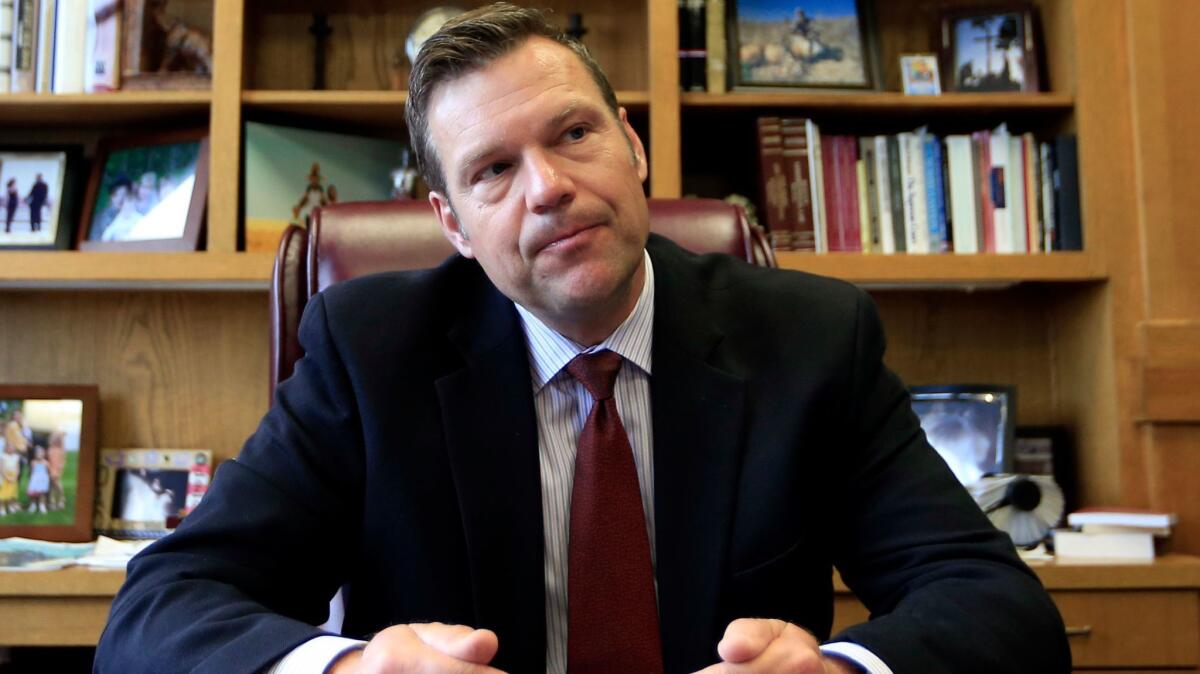Editorial: Trump’s voter fraud commission is a sham. That doesn’t mean our election system is perfect

- Share via
Donald J. Trump became president by winning the Electoral College despite collecting nearly 3 million fewer votes nationwide than his opponent. To Trump, the popular vote results weren’t simply a reflection of his campaign strategy or large blue-state populations. They were proof of election fraud.
That’s the germ of the idea behind the Presidential Advisory Commission on Election Integrity, an ad hoc group Trump created by executive order May 11 to identify the laws, policies and practices that either enhance or undermine the public’s confidence in the voting process, as well as the vulnerabilities that could lead to fraudulent registrations and votes. Not coincidentally, the commission also tapped into an ongoing argument between Republicans, who say voter fraud is a real problem that needs to be addressed with new safeguards at the polls, and Democrats, who say fraud is a smokescreen that the GOP is using to justify its voter-suppression tactics.
We haven’t seen evidence of widespread fraud in either Trump’s election or previous ones — indeed, the research has mostly suggested that there’s been very little of it. Nevertheless, we have no objection to a meaningful, concerted effort to get to the bottom of the issue once and for all.
If the president is sincere about examining the weaknesses in the country’s election system, he should disband this commission and send Kobach back to Kansas.
But if a study of the subject is to be taken seriously, it will have to be done by a panel that is truly bipartisan in makeup, open-minded about what it will find, dispassionate in its analysis and transparent in its methodology. If its conclusions are foreordained or if its methods are secret or if it represents only one side of the debate, that won’t work.
Which brings us to the group Trump assembled. Based on the history and initial actions by its point person, Vice Chairman Kris Kobach, there’s little reason to think this commission can produce credible answers to the questions that Republicans have been raising about the sanctity of elections. Worse, we fear it will ignore the very real threat to election integrity posed by hackers and meddling foreign powers, as seen in the last presidential campaign.
Kobach, who is Kansas’ secretary of state, is an ideologue who’s already concluded that voter fraud is so severe that states should make it harder for people to register and vote, such as by requiring them to show proof of citizenship at the polls. If the commission’s goal is to produce a reasoned and fair-minded analysis of the voting process that persuades people across party lines, it’s a mistake to put such a polarizing person in charge.
In one of his first official acts, Kobach sent a letter to election officials in every state asking for sensitive personal information about the 200 million U.S. registered voters — not just names and addresses, but partial Social Security numbers, voting histories and felony convictions. What privacy protections will be applied? Is it wise to consolidate that much valuable personal information in one place? Why is all that information necessary? If the commission has considered these questions, there was no hint of it in Kobach’s letter.
Nor has Kobach shown himself to be forthright and trustworthy when discussing the information he collects. Witness the fine a federal magistrate recently levied on him for the “patently misleading” statements he’d made to the court about election-related documents he brought to a meeting with President-elect Trump in November.
The response to Kobach’s request from state officials has been frosty. More than 40 states refused to provide some or all of the requested information, with both Democratic and Republican secretaries of state raising concerns about privacy safeguards and potential misuse.
The request for data was only a small part of Kobach’s letter to state elections officials. He also asked for their comments and recommendations on policy or legal obstacles to voter integrity, recommendations for preventing voter intimidation or disenfranchisement and vulnerabilities with voting technology. Those are good topics for a commission to examine. But not this one.
There are enough challenges facing the nation’s voting system to keep a commission busy for years. How should we modernize outdated voting machines? How do we protect electronic voting machines from tampering, as the Department of Homeland Security believes Russian hackers attempted last year?
Then there are a host of issues related to voter turnout. Are there ways to alter the voting process that would get more people to vote? Have voter-ID laws and other tightened security measures had a deterrent effect on actual fraud or have they merely discouraged voting among poor and minority communities? We suspect the answer is the latter, but we want to see the data.
If the president is sincere about examining the weaknesses in the country’s election system, he should disband this commission and send Kobach back to Kansas to run his gubernatorial campaign. Then he can convene another, fully bipartisan commission with a broader mission to safeguard U.S. elections from all threats, be they the occasional duplicate ballot or the hacking of an entire election by a foreign power, and with an open-minded leader who isn’t already invested in a particular outcome.
Follow the Opinion section on Twitter @latimesopinion and Facebook
More to Read
A cure for the common opinion
Get thought-provoking perspectives with our weekly newsletter.
You may occasionally receive promotional content from the Los Angeles Times.









